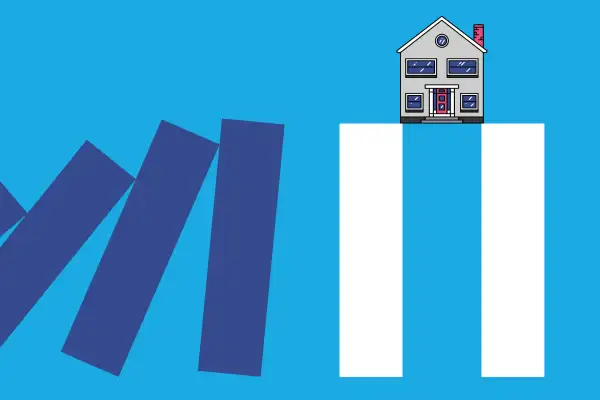The Mortgage Forbearance Deadline Was Just Extended. But There May Be Better Options

Last week, the White House officially extended mortgage forbearance deadlines for homeowners struggling due to the pandemic.
Now, borrowers with government-backed FHA loans, VA loans or USDA loans can enroll in forbearance plans through June 30. The Biden administration also increased the amount of time people can pause their mortgage payments (interest-free) to 18 months total — up from one year. People with conventional loans owned by Fannie Mae and Freddie Mac also have 18 months as long as they applied by February 28. About 2.6 million Americans are currently taking advantage of the relief measures.
If you’re one of the millions facing financial hardship due to COVID-19, pausing your monthly payments a bit longer could offer some relief. But according to experts, it’s not always your best option — especially if you expect your financial difficulties to linger.
“Forbearance isn’t forgiveness,” said Ziggy Jonsson, head of financial products at mortgage lender Better.com. “You still owe the money you were paying; it’s just that there’s a temporary pause on making your monthly payments.”
Once you exit forbearance, those missed payments will come due. In most cases, you can’t be required to repay them all at once, but you might need to get on a short-term repayment plan, take out a second loan, spread your missed payments out over your remaining loan term (meaning higher monthly payments), or tack them on the end of your loan.
“Unpaid payments continue to accrue and — depending on the borrower’s agreement with their loan servicer — they might end up having a higher mortgage payment after the forbearance period,” said Scott Hermann, CEO of IDIQ, a credit and identity theft monitoring firm. “Their loan may also be extended past its current end date. That is something they should factor into their budget before requesting a forbearance.”
For these reasons, experts say forbearance is best for short-term hardships. If you expect to quickly find a new job, recover lost income and land back on your feet, forbearance can bridge the gap.
But if you’re expecting a longer-term struggle? It might be time to look at other options.
1. Get housing counseling.
Talking to a housing counselor can be a good place to start. Not only are these professionals trained to help borrowers address mortgage difficulties, but they can also offer general financial advice — including budgeting help. Many of their services are free, too.
According to Kristen Holt, president and CEO of the Homeownership Preservation Foundation and GreenPath Financial Wellness, housing counselors can help homeowners evaluate and apply for all kinds of mortgage relief options — including payment deferrals, loan modifications, refinancing and forbearance.
“We help borrowers plan and take steps to catch up and maintain their housing payments, resume payments once forbearance ends, understand mortgage terms and interest rates, and avoid scams,” Holt said. Her organization’s counselors will even hop on the phone when borrowers call their loan servicers, explaining the options and terms live, as they’re presented.
If you think counseling may be a good option for you, Holt recommends being proactive — don’t wait until you’re out of options or your forbearance plan is about to expire to seek help.
“The sooner you reach out for support and make a plan to resume mortgage payments, the better,” she said.
2. Modify your loan.
A loan modification allows you to change certain terms of your mortgage loan if you’re facing financial hardship. With this strategy, you might be able to lower your interest rate, reduce your principal balance or extend your loan term (which can lower your monthly payment).
Loan modifications are similar to refinances but have some very important differences — especially if you’re facing financial hardship.
For one, they require closing costs — which generally clock in around 2 to 5% of the loan amount. While you can sometimes roll these costs into the loan balance, doing so means a higher loan amount and larger monthly payments.
Refinancing also requires a moderately good credit score, and you’ll need to prove you have the income to make your new payment, something that could be difficult if you’ve lost your job or had hours cut.
For these reasons, a loan modification is usually a better option if you’re having difficulty making your payments. You can also use a modification when exiting a forbearance plan, according to Yvette Gilmore, SVP of servicing business strategy at ServiceLink, a mortgage servicing technology firm. But be prepared: this might mean a higher monthly payment if your lender spreads your missed payments across the existing loan term.
Regardless of whether you’re modifying your loan in place of or after forbearance, consider getting a housing counselor’s help with the process. According to Holt, homeowners who have leveraged the Homeownership Preservation Foundation’s loan modification counseling have been 20% less likely to fall behind later on.
3. Rent out part or all of your property.
According to a new report from Airbnb, post-pandemic hosts — those who launched their first listing after the World Health Organization declared a pandemic last March — have already earned a cumulative $1 billion in income. On average, new U.S. hosts each earned nearly $4,000 in that time.
Nate Blecharczyk, one of the co-founders of Airbnb, says this short-term rental income can be a smart way for consumers to cover their rent or mortgage. In fact, it’s the exact principle that Airbnb was founded on back in 2008.
"The idea for Airbnb was conceived when Joe [Gebbia], Brian [Chesky] and I needed extra help to pay rent,” Blecharcyzk said.
And new hosts are following suit. Nearly a third of all post-pandemic Airbnb hosts are using their earnings to pay their rent or mortgage, and for hosts ages 25 to 34, it’s a whopping 49%.
Jordan — who started listing his Sevierville, Tenn. property in July — is one of those new hosts. He says Airbnb income covers his mortgage and property upkeep expenses entirely. It has even funded some improvements, too.
“We’re thankful we are able to cover the expenses in full from this income,” said Jordan, who declined to share his last name due to liability concerns. “It would be much harder to cover them without the Airbnb income — without a doubt.”
If you do decide to rent out part of your home, make sure to check your deed restrictions and talk to your HOA (if you have one). You’ll also want to look into local short-term rental laws. In some cities, short-term rentals are limited to certain areas. In others, you may need a license or owe additional taxes to operate one.
4. Sell the house.
With home prices up more than 10% last year and the number of for-sale listings at historic lows, selling your house is another option to consider. According to data from ATTOM Data Solutions, the average home seller raked in nearly $70,000 in profits last year.
If you’re behind on your mortgage, you might not bring as big a profit, but rising equity levels do work in your favor. According to Pat Stone, founder and executive chairman of Williston Financial Group, more than 90% of all homeowners in forbearance have positive equity right now — meaning their home is worth more than they owe on the mortgage.
For this reason, Stone said selling can be a “very good option” — particularly for those who are unable to get back on their feet before federal foreclosure bans end at the end of June.
“Given the current demand for housing, those homes could be sold quickly enough to pay off the underlying loan without being subject to foreclosure,” Stone said.
If you’re worried you might owe more on your house than it’s worth (maybe you took out a home equity loan or did a cash-out refinance recently), a short sale is another option. This is when your loan servicer agrees to let you sell the home for less than your loan balance and forgive the rest.
5. Talk to your loan servicer.
When in doubt, call your loan servicer. Every servicer will offer different relief programs, so talking to a representative directly can ensure you get the full range of options.
“Get in touch with your servicer,” Gilmore said. “Communication and transparency are key. Servicers and lenders want to make it as simple as possible to keep homeowners in their homes, but homeowners need to be proactive.”
If you’re not sure who your servicer is, check your payment vouchers or monthly statement. Because mortgages are often sold after closing, it may or may not be the company you originally got your loan from.
You can also use the Mortgage Electronic Registration Systems website to locate your servicer using your name and address or loan number.
The bottom line
If you’re struggling financially, applying for mortgage forbearance can be a good way to find temporary relief. Because lenders can’t report loans in forbearance as overdue, it can also help protect your credit while you get back on your feet.
But keep in mind: forbearance plans will expire at some point — and those payments will ultimately come due. If you’re worried your finances won’t improve in the near-term, be proactive, and talk to your loan servicer and a housing counselor as soon as possible. They can walk you through your options before it’s too late.
More from Money:
As Prices Soar, 6 Tricks for Finding a House You Can Actually Afford

